|
|
|
Sort Order |
|
|
|
Items / Page
|
|
|
|
|
|
|
| Srl | Item |
| 1 |
ID:
164756
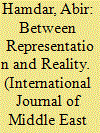

|
|
|
| 2 |
ID:
164751


|
|
|
| 3 |
ID:
164752
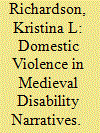

|
|
|
| 4 |
ID:
164754
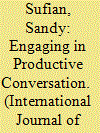

|
|
|
| 5 |
ID:
164750
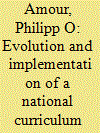

|
|
|
|
|
| Summary/Abstract |
Can a nation mobilizing for an extended armed conflict also construct and implement a national educational curriculum? This article explores the complex and crucial case of the Palestine Liberation Organization (PLO) as it sought to develop a national curriculum while in exile in Lebanon during the 1970s, prior to the inception of the Palestinian National Authority. Based on previously unexamined primary sources from PLO archives, I show how the PLO accomplished a high level of curriculum maturity despite considerable contextual and institutional challenges. The PLO mainstream embraced this curriculum as a political instrument of anticolonial and postdiasporic education suitable for regenerating a sense of community, fostering nation building, and increasing the PLO's political legitimacy. However, as can be expected in a colonial or diasporic setting, the process of educational transition remained uneven, fragile, and dependent on the PLO leadership's ability to navigate conflicts and negotiate arrangements with colonial power, host states, and international organizations.
|
|
|
|
|
|
|
|
|
|
|
|
|
|
|
|
| 6 |
ID:
164748
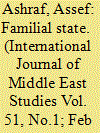

|
|
|
|
|
| Summary/Abstract |
This article examines the social makeup of the early Qajar administration or chancery (dīvān). Using a wide range of Persian sources, the article focuses on those individuals who held offices in the dīvān and traces their family, social, and geographic backgrounds, highlights their marital ties, and reveals their sources of economic and social prestige. In doing so, the article draws attention to patterns of continuity and change between Safavid, Afsharid, Zand, and Qajar rule, and to the familial and informal nature of political power during the early Qajar period (1785–1834). Ultimately the article suggests that an analysis of the social makeup of the dīvān, and of what political office-holders actually do, offers a more fruitful pathway for understanding the formation of Qajar Iran than a focus on institutions and political structures.
|
|
|
|
|
|
|
|
|
|
|
|
|
|
|
|
| 7 |
ID:
164755


|
|
|
| 8 |
ID:
164745
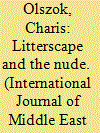

|
|
|
|
|
| Summary/Abstract |
Mansur Bushnaf's al-ʿIlka (Chewing Gum; 2008) is the author's sole novel, born of his twelve-year imprisonment in a Libyan jail, and his reflection on the nation's subjection to international marginalization and dictatorial rule under Gaddafi. The novel is centered on a 19th-century nude which confounds all who encounter it, and which lies neglected in a corner of Tripoli's Red Palace Museum. Through this statue, and the novel's broader poetics of stasis and “chewing,” I explore how turāth in Bushnaf's work, and wider Libyan fiction, is depicted through its abject vulnerability and exposure to historical vicissitudes, reflecting the parallel exclusion of human lives from rights and agency. In al-ʿIlka, I examine how this is formulated into a defamiliarizing perspective on the postmodern, and on historical trauma and erasure, in which the possibility of narrative is a driving concern, rooted in existential reflection, as well as the real precarity of those who tell stories in Libya.
|
|
|
|
|
|
|
|
|
|
|
|
|
|
|
|
| 9 |
ID:
164747
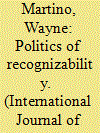

|
|
|
|
|
| Summary/Abstract |
In this article we examine accounts of self-identifying Iranian gay men. We draw on a range of evidentiary sources—interpretive, historical, online, and empirical—to generate critical and nuanced insights into the politics of recognition and representation that inform narrative accounts of the lived experiences of self-identified gay Iranian men, and the constitution of same-sex desire for these men under specific conditions of Iranian modernity. In response to critiques of existing gay internationalist and liberationist accounts of the Iranian gay male subject as a persecuted victim of the Islamic Republic of Iran's barbarism, we address interpretive questions of sexuality governance in transnational contexts. Specifically, we attend to human rights frameworks in weighing social justice and political claims made by and on behalf of sexual and gender minorities in such Global South contexts. In this sense, our article represents a critical engagement with the relevant literature on sexuality governance and the politics of same-sex desire for Iranian gay men that is informed by empirical analysis.
|
|
|
|
|
|
|
|
|
|
|
|
|
|
|
|
| 10 |
ID:
164757


|
|
|
| 11 |
ID:
164753


|
|
|
| 12 |
ID:
164749
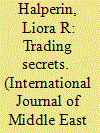

|
|
|
|
|
| Summary/Abstract |
Two Arabic-speaking Jewish guards worked in the European Jewish agricultural colony of Petah Tikva soon after its founding, northeast of Jaffa, in 1878: Daud abu Yusuf from Baghdad and Yaʿqub bin Maymun Zirmati, a Maghribi Jew from Jaffa. The two men, who worked as traders among Bedouin but were recruited for a short time by the colony, offer a rare glimpse of contacts between Ashkenazi and Middle Eastern Jews in rural Jewish colonies established in the last quarter of the 19th century, colonies that are often regarded as detached from their local and Ottoman landscape. The article first argues that Zionist sources constructed these two men as bridges to the East in their roles as teachers of Arabic and perceived sources of legitimization for the European Jewish settlement project. It then reads beyond the sparse details offered in Ashkenazi Zionist sources to resituate these men in their broad imperial and regional context and argue that, contrary to the local Zionist accounts, the colony was in fact likely to have been marginal to these men's commercial and personal lives.
|
|
|
|
|
|
|
|
|
|
|
|
|
|
|
|
|
|
|
|
|